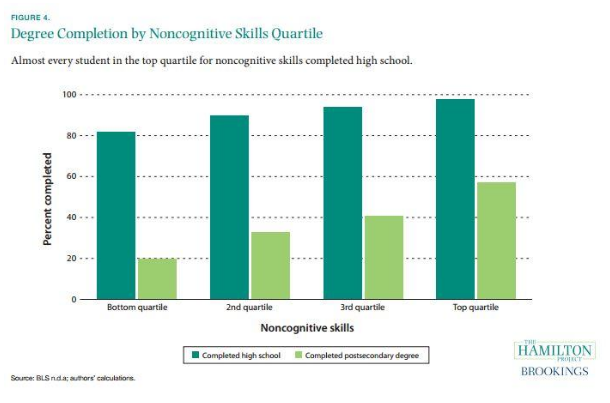It’s no longer enough to fill your CV with impressive grades. Employers are looking beyond qualifications to figure out what other skills their candidates have.
Cognitive skills in topics like maths and English have long been used as to measure the calibre of a job candidate. But a report by The Hamilton Project, an economic think-tank, says that non-cognitive skills are also integral to educational performance and success at work – and are becoming increasingly so.
Non-cognitive skills are your “soft skills”: things like how well you can communicate, how well you work with others, how well you lead a team and how self-motivated you are.
The report says that, to a certain extent, those soft skills inevitably depend on people's personality: “some individuals have an inherently easier time getting along with others” for example. They are also closely linked to the level of education a person has received, as well as that of their parents.
However, these skills can also be taught, says the report.
Not enough skills
The Hamilton Project referenced a survey of hiring managers in the US, which suggests that they are just as worried about finding people with the right non-cognitive skills as with more traditional and measurable abilities.
“While fewer than 20% of hiring managers said that recent graduates lacked the math skills needed for the work, more than half said that recent graduates lacked attention to detail. About equal shares of hiring managers saw deficiencies in writing proficiency and communication—the cognitive and non-cognitive aspects, respectively, of a single skill. About a third of hiring managers said recent college graduates lacked data analysis and teamwork skills,” says the report.
Why is this important?
The Hamilton Project argues that non-cognitive skills are crucial for the labour market for four key economic reasons.
1. Today’s jobs demand more non-cognitive skills than they did in the past.
This graph shows that tasks that involved working with or for people – requiring better non-cognitive skills - are substantially more important today than they were in the 1980s and 1990s. Tasks such as social skills and service skills have grown by 16 and 17% respectively, while tasks that require high levels of maths have only grown by 5%.
2. The labour market increasingly rewards non-cognitive skills.
These charts show the link between salary and both types of skills.
3. And the more likely they are to be in full time employment.
These two bar charts show how, as non-cognitive and cognitive skills go up, so do earnings and the probability of full-time employment. This is unsurprising, but the data also shows how non-cognitive skills have become much more important over time.
4. Those with fewer non-cognitive skills are being left behind.
This final chart shows that almost all of those who are in the top 25% in non-cognitive skills complete high school, and more than half complete a degree.
Leaving qualifications behind
Some companies are indeed bypassing qualifications altogether and using their own methods of assessing a candidate. In 2015 the global accountancy firm Ernst & Young said that they were going to use their in-house assessment programme and numeracy tests. “At EY we are modernising the workplace, challenging traditional thinking and ways of doing things. Transforming our recruitment process will open up opportunities for talented individuals regardless of their background and provide greater access to the profession,” says the company.
The World Economic Forum Future of Jobs report argues that emotional intelligence, creativity, and people management will be among the top skills needed for jobs in 2020. “Change won’t wait for us: business leaders, educators and governments all need to be proactive in up-skilling and retraining people so everyone can benefit from the Fourth Industrial Revolution,” the report states.
Latest Stories
-
Over 200 substandard hospitality facilities in the Ashanti region face closure by GTA
6 minutes -
Sinapi Aba’s Joyce Owusu-Dabo honoured Personality of the Decade by African Women in Banking and Finance Magazine
22 minutes -
Africa AI Health forum explores practical uses of generative AI in healthcare
48 minutes -
AG has recovered 10.6% of the Unibank liability, not 60% as he claims – Bright Simons
1 hour -
Residents commend MTN for community engagement, call for continuous service improvements in Tsito
1 hour -
Al-Azhariya Islamic cluster of schools in deplorable state: Teachers call for renovation
1 hour -
France urged to address colonial legacy as Senegalese activists call for reparations in Dakar Roundtable
1 hour -
“Eat AI, drink AI, live AI” – UG Professor
1 hour -
Direct Relief applauds Breast Care International for lifesaving medical support in Ghana
1 hour -
“A cultural force and national treasure” – Tourism Minister pays tribute to late Daddy Lumba
1 hour -
Kufuor mourns Highlife icon Daddy Lumba: “A thunderbolt to the nation”
1 hour -
Hindsight: Zito’s Kotoko era begins with a blast from the past
1 hour -
Prosper Ogum appointed Black Starlets boss and GFA head of coaching education
2 hours -
NSMQ 2025: Prempeh College into Ashanti Zonal semis, chasing first title since 2021
2 hours -
“A true professional and musical gem” – Appietus pays tribute to Daddy Lumba
2 hours





